
Poison in the Airplane? Fume Events, Contaminated Cabin Air and Aerotoxic Syndrome
Some amendments of cultural history on the topic "Flying is safe"
The technical problem is well known in the industry: the air in an airplane is tapped from the turbines. Turbines - more precisely: the engines - are high performance engines that require a special lubricant to keep them from running hot: synthetic oils. I.e. one of the ingredients: an organophosphate–base used for pesticides and chemical warfare agents, TCP (tricresyl phosphate), is highly toxic. Banned ages ago in car engine oils, this nerve poison is an integral part in jet engine oil. We know about more than 50 other potentially health hazardeous substances. For example, evaporated hydraulic fluids or in winter, de-icing fluids. In their normal state they hardly pose any particular problem, but at 400°C and more, the effects are quite different. And that’s where the next problems begin: for the health of everybody who flies.
You can access and link to this topic directly: www.ansTageslicht.de/cabinair. We document recent larger incidents, but especially current developments regarding this problem in our Aero-Toxic Log book: www.ansTageslicht.de/ENATLB. And please have a look at www.ansTageslicht.de/fume-event-files, where we provide specific documents (cockpit-flight-reports a.o.) and scientific findings.
The German version is available at www.ansTageslicht.de/Kabinenluft. The information from there is translated by Bearnairdine BEAUMONT who operates the network www.aerotoxicteam.com and the blog www.aerotoxicsyndrombook.com/blog.
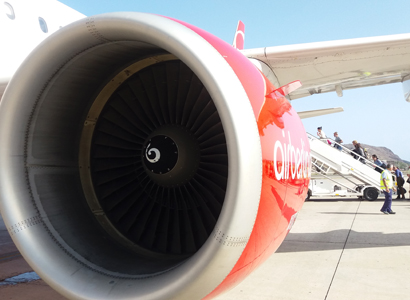
Fume Events Worldwide
Every day it happens. Worldwide. And no one cares. Just the people affected. And then it's usually too late.
weiterlesen
What is different when we fly at 10 km altitude?
High up above the clouds the air is not only very thin, but also ice-cold. The fact that the air in cockpit and cabin can be drawn off via the engines and turbines is very practical. However, this is where the problems begin. The tapped air is hot. Up to 450°C ...
weiterlesen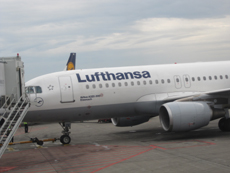
Contaminated cabin air: a health problem becomes certainty. The chronology of the socalled Aerotoxic Syndrome
It all started with the jet plane. And the turbines: synthetic oils that contain nerve toxins are needed - a health risk, if there are any glitches. And they are more common than one realizes. In the following you can find a chronology, as to how manufacturers, airlines, politicians and authorities deal with it; and with the people's health.
weiterlesen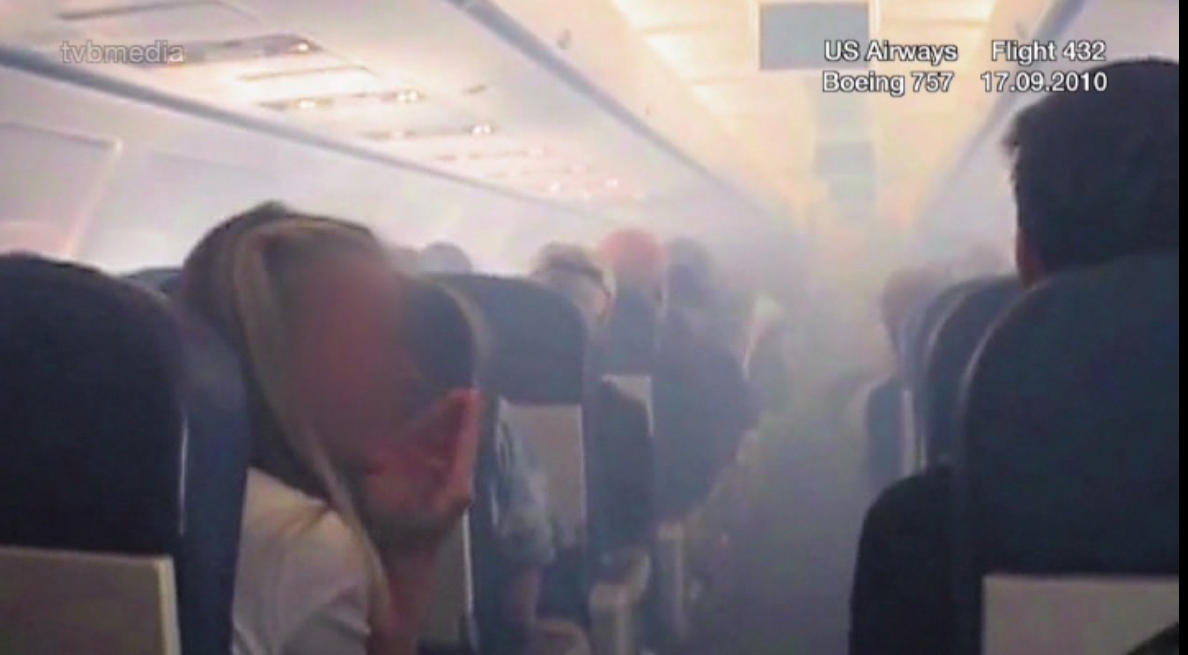
"Incidents": Incidents that do not usually appear in official statistics
It is not always as shown here on a Boeing 757 flight on September 17, 2010 : visible smoke-like fumes and a pungent stench in the whole plane ("fume event“). Sometimes there is only a smell ("smell event") and usually not even that. Nevertheless: the risk always flies along with you. And it is most dangerous if you do not notice it. Because you can not take any counter-measures when it’s too late.
weiterlesen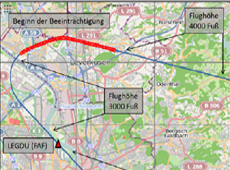
Lufthansa’s subsidiary ‚Germanwings’: December 19, 2010
Disaster almost struck but, luckily it didn't: Both pilots were practically knocked-out due to a fume event - one of the most dangerous incidents so far - as far as we know. This too was an incident not made known by the airline nor the authorities ( e.g. the BFU). It was a journalist who raised the case during a hearing in the Bundestag. Only then did the BFU start an investigation. Everyday life in German aviation?
weiterlesen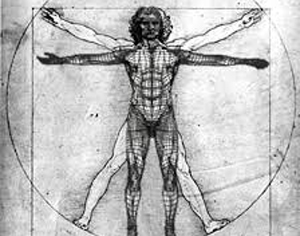
Health, Science and Economic interests in Aerotoxic Syndrome
Health and science, respectively medicine are allies: the more you know, the better you can help. Even better: prevent. However, this is only possible if one takes an objective approach and accepts problems or uncertainties as such - as long as one does not know any better. However, when medicine and science serve (and are supposed to) serve specific interests, most of the time the health suffers. As it does with the aerotoxic syndrome.
weiterlesen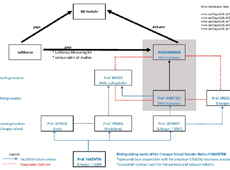
An UNCOVERING of Tricks, Methods and Strategies, how to downplay fume events
Over decades a uniform pattern has been applied successfully by the industry: First deny everything, then downplay it and in the end when nothing else works, create confusion. This was the case with asbestos, dioxin and other toxic pollutants. And so it is with aerotoxic syndrome, respectively fume events. The focus is on one "expert": Wolfgang ROSENBERGER. Occupation: laboratory technician. He is paid for by Lufthansa and the employers' liability insurance association - a perpetuum mobile
weiterlesen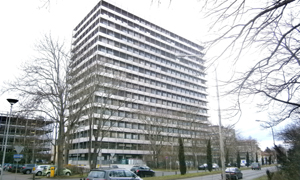
1 Reviewer - 2 Opinions: Prof. Dr. Stephan LETZEL
What does a court do and what does an expert do when both, by order from 'above' - have to judge and evaluate a second time but quite differently? The following is the story of such a case. It shows how independent or dependent experts work. It concerns no one other than the Vice President of the German Society for Occupational and Environmental Medicine (DGAUM).
weiterlesen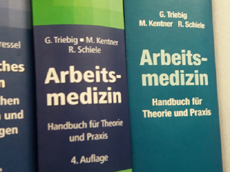
Occupational Medicine in Germany: "Misleading Representation"?
The accusation of "organized misrepresentation" weighs heavily. None other but a former Federal Minister for Labor and Social Affairs has raised it: against 2 highly reputated occupational physicians. Medical everyday life in Germany? The following text explains why nothing moves at "fume events" either.
weiterlesen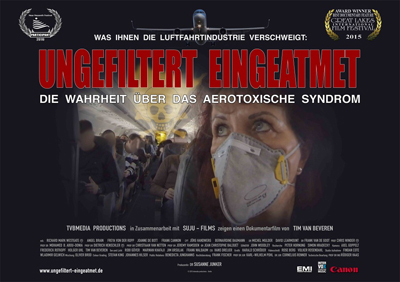
Tim van BEVEREN and the WDR documentary "Nervengift im Flugzeug" (Nerve Poison in Aircraft“): Chronicle of a film making, which turned into 2 (different) documentaries
The reconstruction is the result of our research and a lot of information from filmmaker Tim van BEVEREN. The ‚Westdeutscher Rundfunk’ (WDR) refused answers to our questions. Influenced by the airline Lufthansa?
weiterlesen
What Can You Do ?
Tips and advice in the case of smell and fume events - for passengers and crew
weiterlesen
Online am: 02.01.2017
Aktualisiert am: 02.09.2020
Inhalt:
- Fume Events Worldwide
- What is different when we fly at 10 km altitude?
- Contaminated cabin air: a health problem becomes certainty. The chronology of the socalled Aerotoxic Syndrome
- "Incidents": Incidents that do not usually appear in official statistics
- Lufthansa’s subsidiary ‚Germanwings’: December 19, 2010
- Health, Science and Economic interests in Aerotoxic Syndrome
- An UNCOVERING of Tricks, Methods and Strategies, how to downplay fume events
- 1 Reviewer - 2 Opinions: Prof. Dr. Stephan LETZEL
- Occupational Medicine in Germany: "Misleading Representation"?
- Tim van BEVEREN and the WDR documentary "Nervengift im Flugzeug" (Nerve Poison in Aircraft“): Chronicle of a film making, which turned into 2 (different) documentaries
- What Can You Do ?
Tags:
